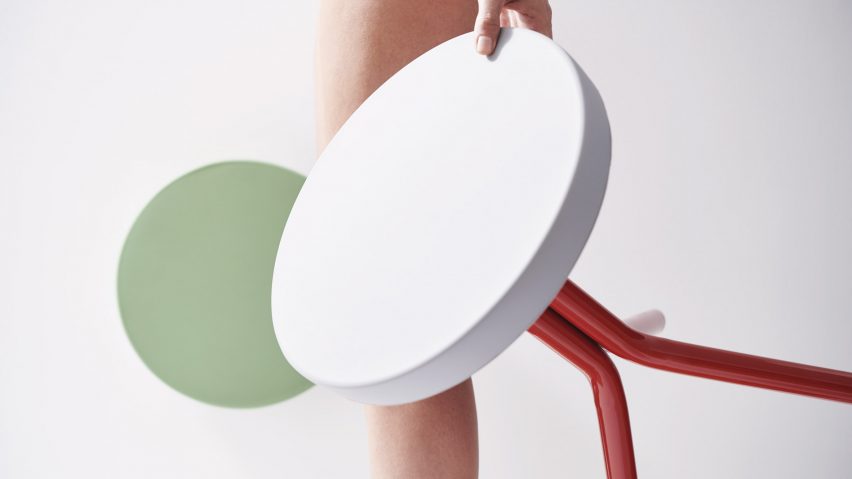Italian designer Nicola Golfari has created a series of household objects that make everyday tasks easier for people with disabilities, including a folding shower seat and a tilting mirror.
Each object in the Lifetools collection is based on the principles of Design for All, which state that design should respect the diversity of users and be accessible for all.
They should be safe, functional, sustainable, affordable, straightforward to use, and appealing.
"Everyone is vulnerable to permanent or temporary disabilities and may find themselves in need of objects to help perform even the simplest of tasks," said the designer.
"Lifetools are for everyone, because the fact they are based on Design for All principles doesn't stop them from being used by anyone and chosen because of their appeal, and not only from need," he added.
Created in association with Scivola, the series of household objects will be displayed at an accessibility-related event in Tortona District during Milan design week, which is taking place from 9 to 14 April.
Featured in the collection is a folding wall-mounted seat called Pill, which is designed for use in the shower or "anywhere a convenient and comfortable seat is needed."
When not in use, the seat folds up to look like a "cheerful" shower-wall decoration in the form of a colourful silicone disc.
When in use, the seat's roto-translating mechanism makes it easy for users to grip and operate, without the need for them to get into uncomfortable positions.
The silicone cover is also detachable, making it easy to clean and simple to adapt the seat for use in different settings.
The collection also features a tilting wall mirror, aptly named Tilt, which boasts a moveable glass surface. The glass sits in a fixed frame with a simple, circular design that comes in a variety of colours, making it easy to integrate into any setting.
Tilt also comes in a Light version, which features a strip of warm LED lighting around its perimeter to provide a direct yet soft source of light for the face.
"The idea of designing a new chair, a new table or a new lamp comes naturally to design enthusiasts like us," said Golfari. "But how many of us find it interesting to design a broom, a walking frame or a television?"
"Lifetools believes the role of design is to work in different skill areas, or in this case product types, that are often overlooked in a project-based culture."
Other objects in the collection include the Quattroviti shower stool and the Slice Grip and Slice Color grab bars. The Quattroviti stools offer "a point of colour in our daily routine", comprising a metal structure with curved, tubular legs and a soft silicone seat.
A three-legged base allows the stool to fit snug in shower corners, or flush against walls, which can provide a backrest. The silicone seat is soft to sit on while still offering grip and impact resistance.
The Slice grab bars are tubular structures mounted to the wall to offer solid support. Made from powder-coated steel, the bars feature gently curving end-sections and no bushings to create the illusion that they penetrate the surface of the wall.
Scivola and Golfari were brought together by a shared approach to designing for accessibility. The resulting Lifetools collection aims to provide designs for living spaces and household products that can be used by as many different people as possible.
"Lifetools are industrial design objects, which means they are devised and developed right from the outset in close collaboration with the production structure," said Scivola.
"Each product in the collection has been created on the back of research into technologically advanced and aesthetically pleasing solutions that the company has in certain cases patented," the organisation added.
In a similar project, IKEA recently released a set of furniture hacks that anyone can download and 3D-print to make their products more usable by people with disabilities, such as bigger light switches, easier-to-grab handles and extenders for couch legs.

